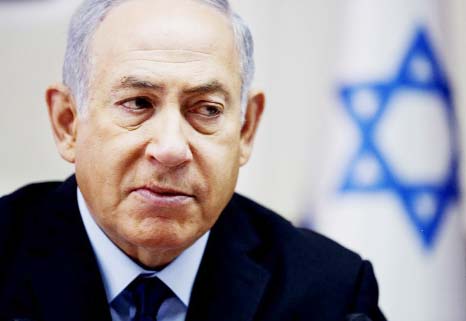
AFP, Jerusalem :
Israeli Prime Minister Benjamin Netanyahu has said he welcomes mediation from the United Nations and Egypt to prevent a humanitarian collapse in the Gaza Strip, Israeli media reported Tuesday.
Netanyahu made the comments in a briefing to local journalists on Monday, various Israeli newspapers reported.
Egypt and UN officials have been seeking a long-term truce between Israel and Islamist movement Hamas, which runs the Gaza Strip, with Qatar providing humanitarian assistance.
Months of unrest along the Gaza border have led to fears of a fourth war since 2008 between Israel and Palestinian militants in the blockaded enclave. “We are working to prevent forces getting into Israel to harm our soldiers and communities,” Netanyahu said, quoted by Haaretz newspaper.
“On the other hand, we’re working to prevent a humanitarian crisis, which is why we’re willing to accept the UN and Egyptian mediation efforts to achieve quiet and fix the electricity situation.”
Israeli officials rarely comment publicly on the efforts by Egypt and others to restore calm and ease humanitarian conditions in Gaza.
The Gaza Strip faces a severe electricity shortage, high unemployment and lack of clean water, among other humanitarian concerns.
Netanyahu has faced criticism from some who have called for a large-scale Israeli military operation in the Palestinian enclave in response to the unrest.
But such an operation would have unpredictable results at a time when Israeli elections are expected to be called in the coming months.
At least 218 Palestinians have been killed by Israeli fire in demonstrations and clashes along the Gaza border that began on March 30. One Israeli soldier has been killed along the frontier in that time.
Israel says its actions are necessary to defend the border and stop infiltrations and attacks, which it accuses Hamas of seeking to orchestrate.
Palestinians and rights groups say protesters have been shot while posing little threat.
There have also been several military flare-ups.
In the latest on Friday and into Saturday, Palestinian militants fired dozens of rockets into southern Israel, which responded with extensive air strikes.
The violence came to an end after Islamic Jihad, the Palestinian militant group that launched the rockets, said it had agreed to an Egyptian-brokered truce.
Israeli Prime Minister Benjamin Netanyahu has said he welcomes mediation from the United Nations and Egypt to prevent a humanitarian collapse in the Gaza Strip, Israeli media reported Tuesday.
Netanyahu made the comments in a briefing to local journalists on Monday, various Israeli newspapers reported.
Egypt and UN officials have been seeking a long-term truce between Israel and Islamist movement Hamas, which runs the Gaza Strip, with Qatar providing humanitarian assistance.
Months of unrest along the Gaza border have led to fears of a fourth war since 2008 between Israel and Palestinian militants in the blockaded enclave. “We are working to prevent forces getting into Israel to harm our soldiers and communities,” Netanyahu said, quoted by Haaretz newspaper.
“On the other hand, we’re working to prevent a humanitarian crisis, which is why we’re willing to accept the UN and Egyptian mediation efforts to achieve quiet and fix the electricity situation.”
Israeli officials rarely comment publicly on the efforts by Egypt and others to restore calm and ease humanitarian conditions in Gaza.
The Gaza Strip faces a severe electricity shortage, high unemployment and lack of clean water, among other humanitarian concerns.
Netanyahu has faced criticism from some who have called for a large-scale Israeli military operation in the Palestinian enclave in response to the unrest.
But such an operation would have unpredictable results at a time when Israeli elections are expected to be called in the coming months.
At least 218 Palestinians have been killed by Israeli fire in demonstrations and clashes along the Gaza border that began on March 30. One Israeli soldier has been killed along the frontier in that time.
Israel says its actions are necessary to defend the border and stop infiltrations and attacks, which it accuses Hamas of seeking to orchestrate.
Palestinians and rights groups say protesters have been shot while posing little threat.
There have also been several military flare-ups.
In the latest on Friday and into Saturday, Palestinian militants fired dozens of rockets into southern Israel, which responded with extensive air strikes.
The violence came to an end after Islamic Jihad, the Palestinian militant group that launched the rockets, said it had agreed to an Egyptian-brokered truce.

